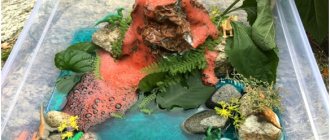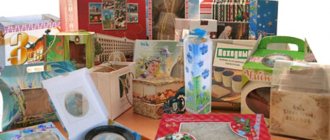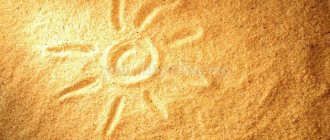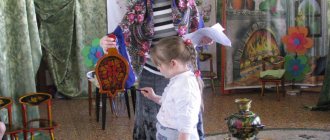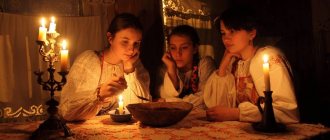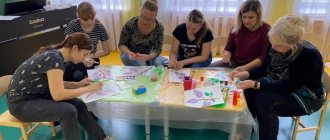Theme: “Journey to the City of Masters”
Goal: Continue to develop interest in people, consolidate children’s knowledge about the senses, their role in a person’s perception of the world around them.
Tasks:
Correctional and educational:
- generalize children’s existing knowledge about the functions of the senses;
- clarify the meaning of the senses for a person when he perceives the world around him;
- develop the ability to analyze data obtained through experimentation;
- discuss issues of sensory organ hygiene.
Corrective and developmental:
- develop conversational speech using high-quality adjectives, replenish the vocabulary with phrases “organ of hearing, organ of vision, auricle, membrane, touch”;
- develop tactile, auditory, gustatory, visual sensations;
- develop quick thinking and creative imagination;
- expand your horizons.
Correctional and educational:
- cultivate a caring and caring attitude towards your body;
- Cultivate curiosity and the ability to listen carefully.
Methods and techniques:
- visual (show, demonstration);
- verbal (conversation, literary expression, logical reasoning, question - answer);
- gaming (didactic games, surprise moment, finger play;
- practical (drawing, exercises, experimentation, introspection).
Preliminary work:
- conversation about the senses of animals and humans;
- conversation on the topic “Different professions are important”;
- conversation on the topic “Vision”;
- conversation on the topic “Our hands”;
- reading fiction: “What crafts smell like”, K. I. Chukovsky “Moidodyr”, “Doctor Aibolit”, A. Barto “Glasses”;
- plot-based role-playing game “Hospital”;
- learning a set of exercises for the eyes;
- cycle of educational situations on valeology (sense organs)
- viewing educational drawings;
- learning didactic and outdoor games.
Health saving technologies:
- breathing exercises;
- gymnastics for the eyes;
- back massage;
- games with speech accompaniment.
Summary of OOD for the preparatory group “Journey to the Land of Experiments”
Summary of GCD for experimentation in the preparatory group
" Journey to the Land of Experiments " .
Target:
Introduce children to natural phenomena - volcanoes, their structure, the cause of the eruption.
Tasks:
Educational:
-Introduce children to the natural phenomenon of a volcano, the cause of its eruption.
-Continue to teach children to see the problem and make generalizations. To develop the ability to establish cause-and-effect relationships during an experiment and draw conclusions.
-Clarify ideas about natural phenomena: volcanic eruption, rainbow. Enrich children's vocabulary with words: mountain, volcano, crater, lava, laboratory, experiments.
Educational:
-Develop children’s cognitive activity in the process of independently performing experiments.
-Develop observation, curiosity, mental activity, memory, speech, logical thinking.
Educational:
-To cultivate children's interest in experimental activities in the process of practical activities.
Materials and Equipment:
A carafe with water, red paint, soda, detergent, citric acid, measuring cups, a tray, a model of a volcano, teaspoons, napkins, slides with images of volcanoes, white coats for children and the teacher, a projector, an interactive whiteboard, a laptop.
NODE STROKE:
Organizing time
Educator:
Hello guys, I'm very glad to see you. I'm in a great mood today because the sun is shining brightly, it gives me a spring mood. And I want to give it to you guys. Good mood too.
Educator:
Guys, show me what mood you are in. My good mood plus your good mood.
Educator:
Look, you and I have made a wonderful team. I hope that now you will become my real helpers.
Educator:
Today we will take a fascinating journey to the land of experiments to visit my friend the professor.
There you will learn a lot of new and interesting things
.
Educator:
What is
an experiment
? Where are they usually held? Everything is correct, in the laboratory.
Educator:
Children, do you like to conduct experiments?
(yes.)
Educator:
Then I propose to go with me to the scientific laboratory.
Educator:
Do you know how to behave correctly in the laboratory?
1. Do not touch devices and tools without permission.
2. Do not taste or smell the substance.
unknown experiments with substances
.
Educator:
Let's get ready for our journey and put on special clothes, since in a real scientific laboratory you need to be in special clothes.
(put on dressing gowns)
Teacher:
So we ended up in the scientific laboratory of Professor Chudakov.
